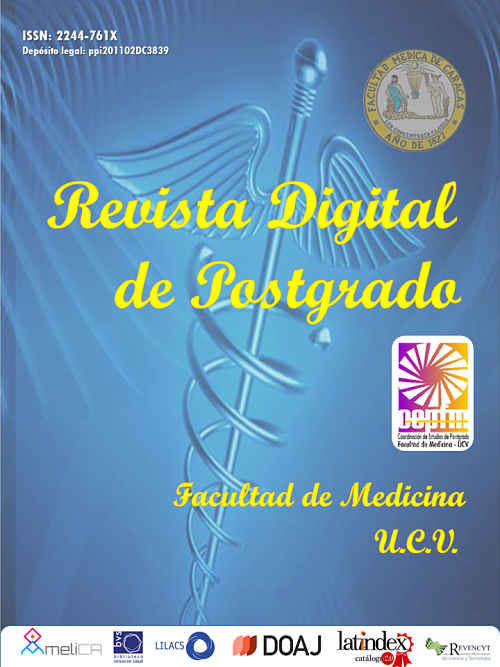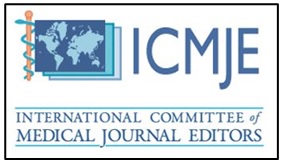Characterization of Special Research Works 2016-2023
DOI:
https://doi.org/10.37910/RDP.2024.13.3.e401Keywords:
Thesis, Research, Nursing, UndergraduateAbstract
Abstract Introduction: The Special Research Works (TEI) of the School of Nursing of the Central University of Venezuela, represent the first approach with formal research and are a requirement to complete undergraduate studies. Objective: To characterize the TEI presented by students as a partial requirement to obtain the degree in nursing, from 2016 to 2023. Materials and Methods: descriptive research with a documentary, retrospective, transversal design. The units of analysis were the TEIs presented between the years 2016 to 2023. The instrument used was the Special Research Work Registry Matrix (MRTEI), validated by experts in the research and teaching area of the EEUCV. Information collection was carried out in the first semester of 2024. Results: 82.4 % of the research papers (TEI) were descriptive, with 90 % employing a quantitative approach. Eighty-two percent were conducted in healthcare settings, with the study population comprising 53 % nursing professionals and 17% patients. The American Psychiatric Association (APA) style was used in 97 % of the papers, while 3 % utilized the Vancouver style. Informed consent was obtained in only 16 % of the TEIs. These results show the need for epistemic and ontological reflection on the research that is required in Nursing; it is necessary to review the standards for its presentation in order to promote its visibility.
Downloads
References
Colás P, Hernández M. Las competencias investigadoras en la formación universitaria. Universidad y Sociedad (Internet) 2021(consultado 26/08/ 2024); 13(1): 17-25.Disponible en: http://scielo.sld.cu/scielo.php?script=sci_arttext&pid=S2218-36202021000100017&lng=es&tlng=es.
Engelmann K, Neuhaus B, Fischer F. Fostering scientific reasoning in education-Meta-analytic evidence from intervention studies. Educational Research and Evaluation (Internet). 2016 (Consultado 10/08/2024); 22, (5): 333-349. https://doi.org/10.1080/138
Robles V, Serrano CA, Estrada A, Miranda Y. Competencias investigativas en profesionales de Enfermería de la Atención Primaria de Salud: necesidad inaplazable. Edumecntro [Internet].2022. [Consultado 1 /09/2024]; 14. Disponible en: https://revedumecentro.sld.cu/index.php/edumc/article/view/1719
Contreras F, Osorio M. Trabajo de grado como instrumento de publicación científica en investigadores novel de enfermería. RVE. (Internet). 2016 (Consultado 10/08/2024) ;3 (1): 51-61. Disponible en: http://saber.ucv.ve/ojs/index.php/rev_venf/article/view/11672.
Meza P. La comunicación del conocimiento en las secciones de tesis de lingüística: determinación de la variación entre grados académicos. Tesis de postgrado. Chile: Pontificia Universidad Católica de Valparaíso; 2013. Disponible en: https://www.researchgate.net/profile/Paulina-Meza-2/publication/305668408_
Hurtado J. Investigación Holística. Ed. Sypal. 2000. Disponible en: https://ayudacontextos.wordpress.com/wp-content/uploads/2018/04/jacqueline-hurtado-de-barrera-metodologia-de-investigacion-holistica.pdf
Zapata R, Rojas J, Molina D, Lagos I, Sanhueza C, Núñez M, et al. Características de las tesis de pregrado de Educación Básica, Parvularia y Diferencial de una Escuela de Educación: Un análisis bibliométrico. Revista de estudios y experiencias en educación. (Internet) 2021; 20, (44): 73-88. https://dx.doi.org/10.21703/0718-5162.v20.n43.2021.005.
Villavicencio E. La importancia de los estudios descriptivos. Rev Evid Odontol. Clinic (Internet). 2016; 2: 6-7. Disponible en: https://www.researchgate.net/publication/315793465_
Universidad Pedagógica Experimental Libertador. Manual de Trabajos de Grado de Especialización y Maestría y Tesis Doctorales. Caracas. Fedeupel; 2016.
Cotonieto-Martínez E, Rodríguez-Terán R. Salud comunitaria: una revisión de los pilares, enfoques, instrumentos de intervención y su integración con la atención primaria. JONNPR [Internet]. [citado 2024 agosto 10]. 2021; 6, (2): 393-410. Disponible en:http://scielo.isciii.es/scielo.php?script=sci_arttext&pid=S2529-850X2021000200011&lng=es
Dandicourt C. El cuidado de enfermería con enfoque en la comunidad. Rev Cubana Med Gen Integr [citado 2024 agosto 10]. [2018; 34,(1): 55-62. Disponible en: http://scielo.sld.cu/scielo.php?script=sci_arttext&pid=S0864-21252018000100007&lng=es.
Pisano M, González A, Abad A. Community and family nurse: Present keys, future challenges. Enfermeria Clínica. (Internet). 2019 (consultado02/08/ 2024); 29(6):364-368. https://doi.org/10.1016/j.enfcli.2019.10.005
Ramírez-Sánchez S, Pérez-Solís O, Lozano-Rangel O. Perspectiva de la Investigación en Enfermería: El caso México. Ene. (Internet) 2019 [consultado 01/09/2024];13, (4):1349. Disponible en: http://scielo.isciii.es/scielo.php?script=sci_arttext&pid=S1988-348X2019000400008&lng=es.
Landeros-Olvera E, Ramírez-Girón N, Yáñez-Lozano Á, Guzmán-Ramírez G, Galicia-Aguilar R M. Temáticas y características metodológicas de la investigación de enfermería publicada en revistas mexicanas: 2010-2015. Enferm. univ [revista en la Internet]. 2018 [citado 2/08/2024]; 15(3): 274-283. https://doi.org/10.22201/eneo.23958421e.2018.3.65994.
Singleterry L. Intentional application of nursing theory in simulated practice. Nursing education perspectives.(Internet) 2020;41(1):41-42. https://doi.org/10.1097/01.NEP.0000000000000446
Alligood M. Nursing theorists and their work. 9th ed. St. Louis, MO: Elsevier Inc; 2018.
Hernández M Paz L, Villota A, Yarpaz Y, Rivas Meneses J, Gallardo K. Importancia de la teoría para la investigación. Boletín Informativo CEI (Internet) [2021;8(2):91-92. Disponible en: https://revistas.umariana.edu.co/index.php/BoletinInformativoCEI/article/view/2685/2974
Valencia-Contrera M, Melita-Rodríguez A. Reflexión de la humanización de la atención: teoría de Jean Watson y propuesta de su aplicación. BENESSERE(Internet).2022;6,(1):1-12.Doi: https://doi.org/10.22370/bre.61.2021.3037
Bedregal P, Besoain C, Reinoso A, Zubarew T. La investigación cualitativa: un aporte para mejorar los servicios de salud. Rev. méd. Chile [Internet]. [citado 7/07/2024); 145, (3):373-379.Disponible en: http://www.scielo.cl/scielo.php?script=sci_arttext&pid=S0034-98872017000300012&lng=es.
Naranjo-Hernández Y, González-Bernal R. Investigación cualitativa, un instrumento para el desarrollo de la ciencia de Enfermería. AMC. (Internet) 2021. [citado20/07/2024);25,(3).Disponible en: http://scielo.sld.cu/scielo.php?script=sci_arttext&pid=S1025-02552021000300015&lng=es. Epub 01-Jun-2021.
Astigarraga M. Guidoni M. Pautas para la citación de bibliografía según normas Vancouver / Guidelines for citation of bibliography according to Vancouver standards. Ludovica pediátr .(Internet) 2018(Consultado 26/07/2024);21,(3):15-21, sept.https://docs.bvsalud.org/biblioref/2018/11/948697/guias-pautas-para-la-citacion-de-bibliografia-segun-las-normas-_RtQuooS.pdf.
Albornoz M. Estrategias para la promoción de las publicaciones científicas argentinas. Acta Bioquím Clín Latinoam(Internet) 2006;40(2): 233 – 237. Disponible en: http://www.scielo.org.ar/scielo.php?script=sci_arttext&pid=S032529572006000200012&lng=es&nrm=iso
Velandia A. Para qué publicar en enfermería. Investigación y Educación en Enfermería. Investigación y Educación en Enfermería.(Internet) 2008; 26, (2, Suppl. 1): 60-71. Disponible en: https://www.redalyc.org/articulo.oa?id=105215278004
Villamañán E, Ruano M, Fernández-de Uzquiano E, Lavilla P, González D, Freire M, et al. El consentimiento informado en investigación clínica: ¿entienden los pacientes lo que firman? Farm Hosp. [Internet]. [26/08/ 2024 ] ; 2016; 40, (3): 209-218. Disponible en: https://dx.doi.org/10.7399/fh.2016.40.3.10411.
Downloads
Published
How to Cite
Issue
Section
License
Copyright (c) 2024 Marlín Guía-Yanes, Maribel Osorio

This work is licensed under a Creative Commons Attribution 4.0 International License.
Usted es libre de:
- Compartir — copiar y redistribuir el material en cualquier medio o formato
- Adaptar — remezclar, transformar y construir a partir del material
- para cualquier propósito, incluso comercialmente.
Bajo los siguientes términos:
-
Atribución — Usted debe dar crédito de manera adecuada, brindar un enlace a la licencia, e indicar si se han realizado cambios. Puede hacerlo en cualquier forma razonable, pero no de forma tal que sugiera que usted o su uso tienen el apoyo de la licenciante.
- No hay restricciones adicionales — No puede aplicar términos legales ni medidas tecnológicas que restrinjan legalmente a otras a hacer cualquier uso permitido por la licencia.











